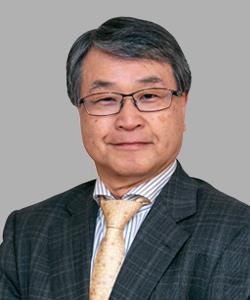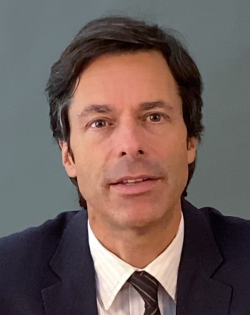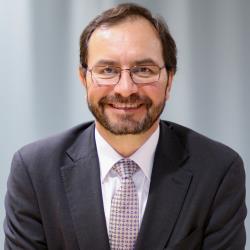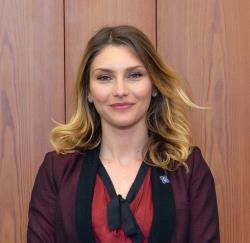International Standards: A Commitment to Inclusivity
ITU
Session 494
The world’s leading developers of international standards – the International Electrotechnical Commission (IEC), International Organization for Standardization (ISO), and International Telecommunication Union (ITU) – provide a trusted platform for digital cooperation among governments, industry, academia, and civil society.
The executive heads of IEC, ISO, and ITU invite you to a discussion on how standards drive global technological progress and opportunities to benefit from standards and conformity assessment in areas from AI and quantum information technologies to environmental sustainability, cybersecurity, and blockchain.

Before his election as TSB Director by ITU Member States, he completed an over 30-year career with Japanese mobile operator NTT DOCOMO. In 2021, he became Executive Vice President and Chief Standardization Strategy Officer for the Nippon Telegraph and Telephone (NTT) Corporation and a Fellow of NTT DOCOMO, INC. From 2017, he served as NTT DOCOMO’s Chief Technology Architect and President of its subsidiary DOCOMO Technology.
Between 2012 and 2017, he served as NTT DOCOMO’s Chief Technology Officer and Executive Vice President, a Member of the Board of Directors, and Managing Director of R&D Innovation Division. Earlier, he served as Senior Vice President and Managing Director of NTT DOCOMO’s R&D Strategy Department and Managing Director of the company’s Radio Network Development Department.
As TSB Director, he heads the part of ITU responsible for the coordination of technical standards and collaborative standardization processes that enable the interconnection and interoperability of information and communication technologies (ICTs) worldwide.
Mr Onoe is committed to facilitating open and inclusive standardization processes, along with promoting digital technologies to address global issues, building a new ecosystem that reflects evolving technologies, and strengthening cooperation and collaboration in ICT standardization worldwide.
Known in the industry as “the father of LTE” (Long-Term Evolution), he helped upgrade the wireless broadband standard for mobile devices and networks. He now aims for global outreach to bridge standardization gaps, deliver the benefits of technology widely and speedily, and ensure meaningful and affordable broadband access for everyone.

Mr Metzger became IEC Secretary-General and CEO on 1 February 2020. Prior to joining IEC, he was Director-General of the Swiss Federal Office of Communications (OFCOM). Mr Metzger was also previously Deputy to the Director of the Development Bureau at the International Telecommunication Union (ITU) and Director of the European Free Trade Association (EFTA). Trained as a lawyer, Mr Metzger has issued several publications on the World Trade Organization (WTO) and competition law.
The Secretary-General is the Chief Executive Officer of the Commission and is responsible for its day-to-day operations.

Sergio Mujica joined ISO as Secretary-General in July 2017, having spent 7 years at the World Custom’s
Organization (WCO) as Deputy Secretary-General. The WCO aims to enhance the effectiveness and
efficiency of Custom’s administrations worldwide, and within this role Mr Mujica was responsible for the
design and implementation of the WCO’s strategic plan. This included simplification, harmonization and
standardization of custom’s procedures in addition to capacity building initiatives aimed at the WCO
members. This gave him significant experience in an international setting, building consensus within a
large membership-based organization.
Prior to working at the World Customs Organization, Mr Mujica spent 15 years working for the
Government of Chile with the Ministry of Agriculture, the Ministry of Economic Affairs and as the
Director General of Chile Customs. A Chilean national, he has a law degree from the Pontificia
Universidad Catolica de Chile and a Master’s degree in International Law from the American University
in Washington DC.

Charlyne Restivo works at the Telecommunication Standardization Bureau (TSB) of the International Telecommunication Union (ITU). She is the Coordinator of the Network of Women in Standards (ITU-T) and the co-chair of the ITU Youth Task Force. She also serves as project officer for the World Standards Cooperation (WSC), the high-level collaboration between the IEC, ISO, and ITU, and for the World Telecommunication Standardization Assembly (WTSA-24). Prior to her current roles, she worked at the Office of the ITU Secretary General.
Charlyne holds a degree in political science and a specialized master's degree in international relations from Sciences Po Lyon, France. She also studied at the University of California Santa Cruz, in the United States, and is a certified PRINCE2 project manager.
-
 C1. The role of governments and all stakeholders in the promotion of ICTs for development
C1. The role of governments and all stakeholders in the promotion of ICTs for development
-
 C5. Building confidence and security in use of ICTs
C5. Building confidence and security in use of ICTs
-
 C6. Enabling environment
C6. Enabling environment
-
 C7. ICT applications: benefits in all aspects of life — E-government
C7. ICT applications: benefits in all aspects of life — E-government
-
 C7. ICT applications: benefits in all aspects of life — E-business
C7. ICT applications: benefits in all aspects of life — E-business
-
 C7. ICT applications: benefits in all aspects of life — E-learning
C7. ICT applications: benefits in all aspects of life — E-learning
-
 C7. ICT applications: benefits in all aspects of life — E-health
C7. ICT applications: benefits in all aspects of life — E-health
-
 C7. ICT applications: benefits in all aspects of life — E-employment
C7. ICT applications: benefits in all aspects of life — E-employment
-
 C7. ICT applications: benefits in all aspects of life — E-environment
C7. ICT applications: benefits in all aspects of life — E-environment
-
 C7. ICT applications: benefits in all aspects of life — E-agriculture
C7. ICT applications: benefits in all aspects of life — E-agriculture
-
 C7. ICT applications: benefits in all aspects of life — E-science
C7. ICT applications: benefits in all aspects of life — E-science
-
 C11. International and regional cooperation
C11. International and regional cooperation
This session on "International Standards: A Commitment to Inclusivity" at the WSIS Forum directly aligns with key WSIS action lines. It highlights how international standards foster collaboration among stakeholders (C1), enhance trust and security in ICTs (C5), create an environment for innovation (C6), enable the development of inclusive ICT applications (C7), and promote international cooperation (C11).
-
 Goal 9: Build resilient infrastructure, promote sustainable industrialization and foster innovation
Goal 9: Build resilient infrastructure, promote sustainable industrialization and foster innovation
-
 Goal 11: Make cities inclusive, safe, resilient and sustainable
Goal 11: Make cities inclusive, safe, resilient and sustainable
-
 Goal 12: Ensure sustainable consumption and production patterns
Goal 12: Ensure sustainable consumption and production patterns
-
 Goal 15: Sustainably manage forests, combat desertification, halt and reverse land degradation, halt biodiversity loss
Goal 15: Sustainably manage forests, combat desertification, halt and reverse land degradation, halt biodiversity loss
-
 Goal 17: Revitalize the global partnership for sustainable development
Goal 17: Revitalize the global partnership for sustainable development